oving fast is one of the pillars of tech and software companies' success. Unlike traditional industries, they are built on innovation, upskilling, and knowledge sharing. That’s why training employees and partners is so important.
Yet, finding an LMS for a tech and software company may be tricky. We understand that it comes from specific training demands, the necessity to be adaptable, and varied audiences.
Read on to learn more about the best LMSs for tech companies with key cases and flexibility in mind.
Choosing LMS for a Software Company: Does a Case Matter?
In software companies, the teams require scalable and repeatable training to stay competitive. Long story short, tech companies would seek an LMS to educate the internal audience, train partners and clients, and handle tech adaptation.
Let’s have a short dive into each use case and how LMS usually helps:
Case#1. Faster onboarding and knowledge sharing
When an IT or tech company grows, new hires must be onboarded quickly. Moreover, as hybrid and remote teams are at the core, fast and intuitive access to internal product knowledge and workflows becomes a priority.
What can an LMS help with? It leverages role-based learning paths, provides blended learning programs, and monitors and tracks learning results.
Case#2. Scalable training for partners
Since a software company sells tech services or products, it usually needs to educate clients and provide guidance. Yet, partner enablement is impossible without structured training. Otherwise, it would lead to poor service/product adoption.
What’s an LMS role? It allows creating dedicated branded learning spaces, issuing certificates to prove skills, and seeing how partners engage with materials.
Case#3. Upskilling and tech adaptation
One more case lies within a more traditional training type. Constant change in tech tools, standards, and security requirements may leave teams behind. To keep up, the tech companies may need a comprehensive LMS or a course provider with specific courses to close skill gaps.
In this case, what’s an LMS role? To deliver on-demand courses, offer microlearning, or a specific environment for advanced programs or tests.
How Do I Pick the Best LMS for a Tech or Software Company?
Considering the use cases, I’ve focused on the key features that an LMS for software companies should have.
Spoiler: they go beyond course creation options and should offer decent functions for role and team-based training.
What about advanced features? We should mention sandbox labs for testing or product adaptation, and couse suggestions.
Yet, for this, tech companies would be better off using separate course platforms or coding environments.
Top LMS Platforms for Tech and Software Companies
The best training software for tech companies includes:
These solutions may be great for SaaS, DevOps, and product-led companies. The primary rationale is that they offer the right blend of speed, scalability, and custom solutions.
#1. EducateMe: Best LMS for Employee and Partner Training
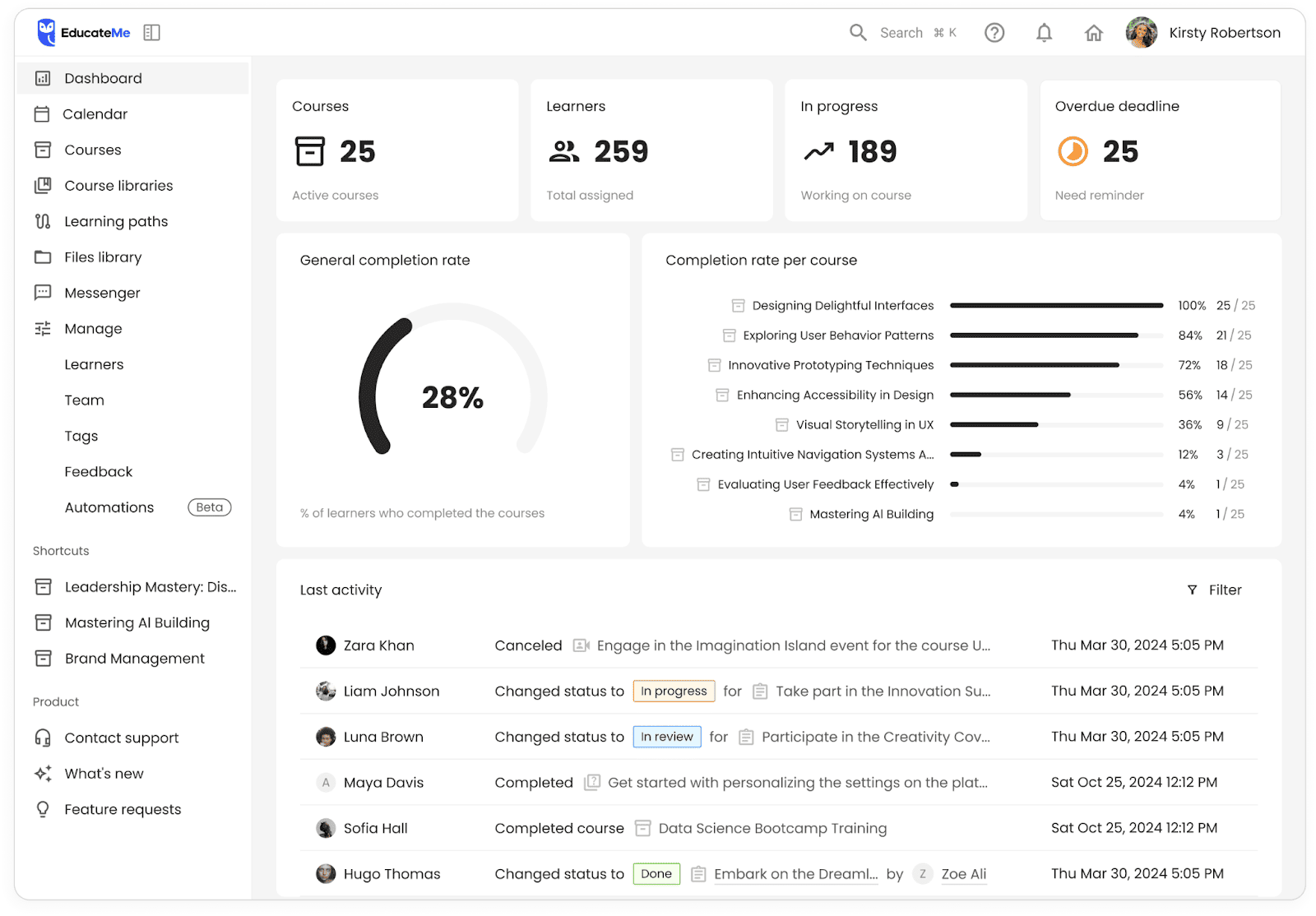
EducateMe is the best LMS for tech companies that need a customizable and flexible platform to handle onboarding, upskilling, or partner education.
Its strength lies in combining a flexible multi-tenant structure, a variety of content formats, and great AI tools. Besides, it provides advanced learning paths for role-based learning and solid automation to manage and schedule activities.
Tech companies would benefit a lot from the ability to set up separate portals for employees and partners. For teams that handle fast-changing or multiple training cohorts, EducateMe brings a content editor, a course library feature, and advanced reporting with tags, which can help.
These features allow closing gaps with different training formats while maintaining consistency.
Key features of EducateMe for tech companies:
- Multi-tenancy and white-label portals. EducateMe is excellent at creating branded spaces for different audiences with role-specific access.
- AI Content & scheduling tools. This LMS for tech companies allows you to automate course generation, assessments, and live session planning.
- Versatile content options. EducateMe is universal, with options to embed media and SCORM files, add quizzes, duplicate courses and modules, or use an iframe to deliver content.
- Advanced reporting. Thanks to the dashboard, customized reports, activity logs, and scoreboard, you can monitor engagement, skills, and completion rates.
Pros: Intuitive and flexible course creation and management, highly customizable environment and paths, robust automation and reporting.
Cons: No mobile app (yet, it’s mobile-optimized); no marketing tools.
G2 Rating: 4.8/5
#2. Trainual: Best LMS for Tech Onboarding and Knowledge Management
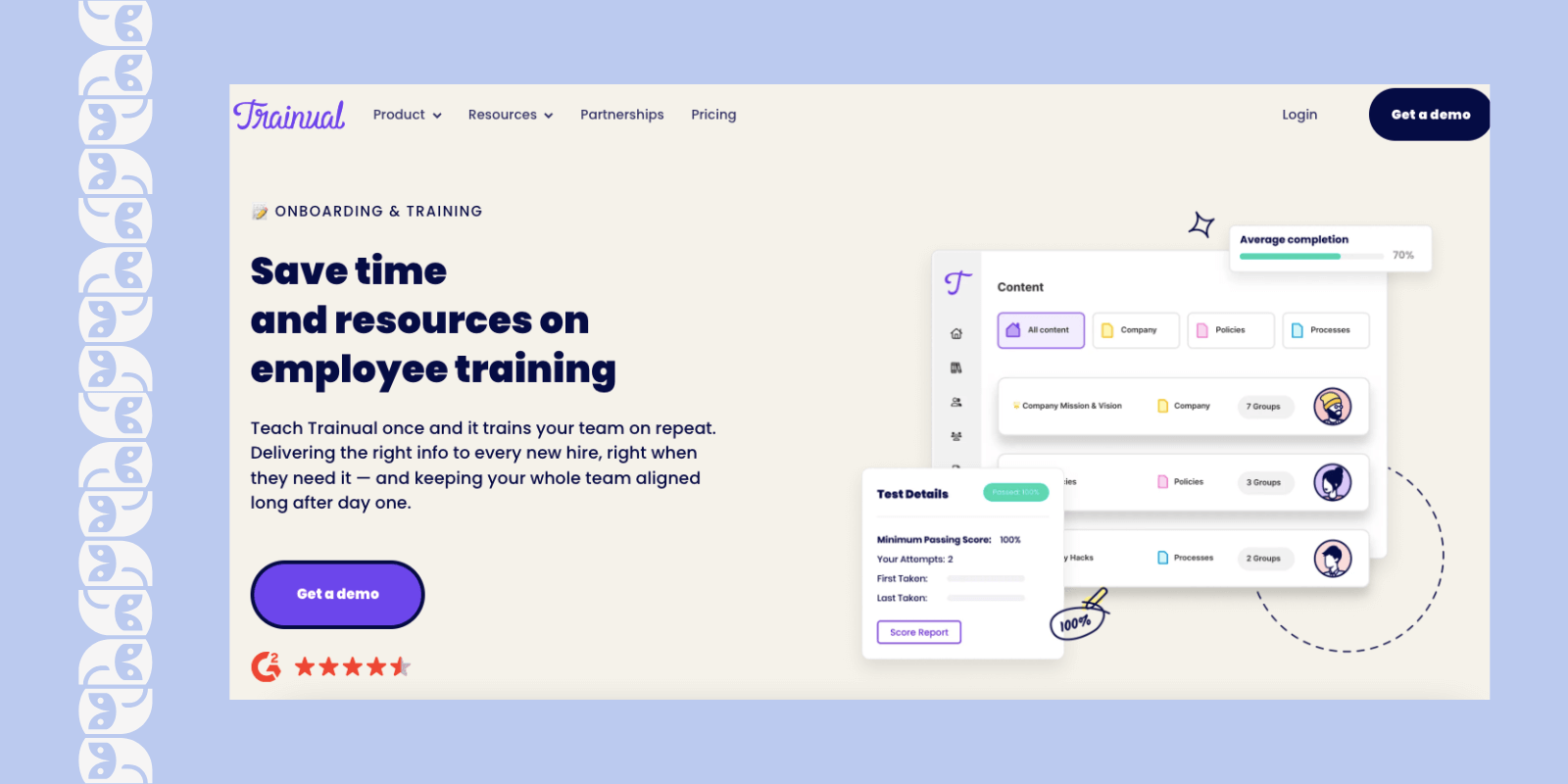
Trainual is a decent LMS for software companies, offering SOP software, a knowledge database, and onboarding flows.
It is best known as the SOP solution, allowing the turning of documentation into engaging courses and creating accessible programs around databases. Besides that, it turns out ot be a solid training hub, making it suitable for all types of compliance training and onboarding.
It provides role-based assignments, an organizational chart, and role mapping for these cases. The platform’s templates effectively automate course creation, while reporting tools appear pretty decent.
Key features of Trainual for tech companies:
- 150+ customizable templates. With Trainual, you can quickly turn SOPs, product guidelines, or policy docs into training modules and educate partners.
- Organizational & role charts. With them, Trainual is effective in onboarding, so you can map responsibilities and bring more clarity to new hires.
- Knowledge base & search. Trainual brings a great system to create a centralized, searchable repository for procedures and need-to-know content.
- Interactive training paths. This solution for tech companies has a decent editor with videos, GIFs, and quizzes for better engagement and retention.
Pros: easy to deploy and update content; very intuitive; provides a centralized approach to content management, interactive elements.
Cons: no SCORM support and limited advanced customization; pricing may be high.
Pricing: Starts at $249/month for 10 employees
G2 Rating: 4.7/5
#3. Disco: Best Community LMS for Software Companies
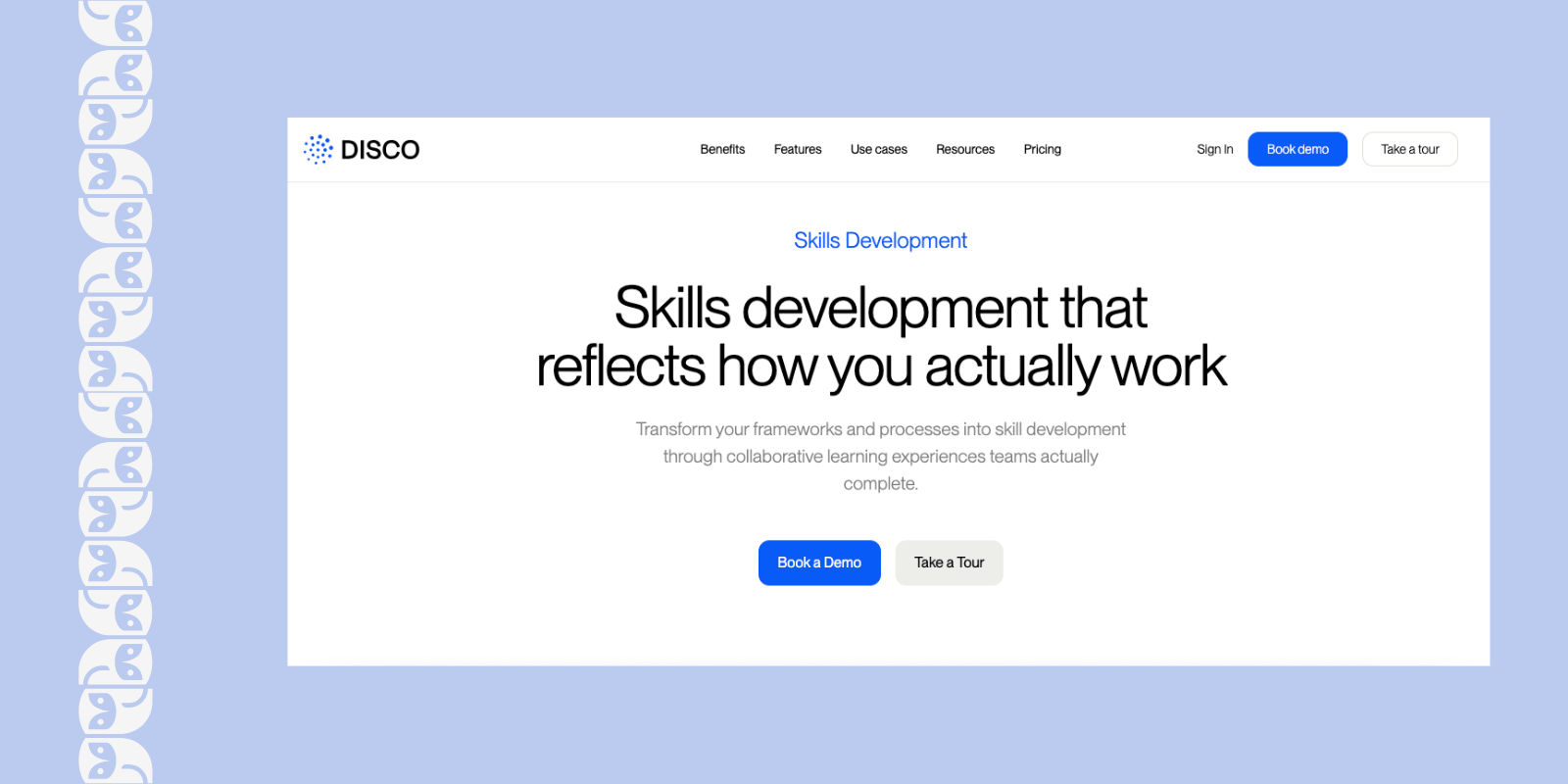
The next option on our list is Disco. Disco is a powerful choice for tech companies that want to train employees and partners with a community approach. It offers cohort-based learning, where learners can collaborate, share insights, and learn from each other.
Thus, it is pretty good for partner training. It offers decent AI tools to turn docs into programs, adding to scalability and content management.
Also, for tech firms training client ecosystems, it provides event scheduling, peer discussions, and branded academies. This approach aims to offer an interactive and retention-focused learning experience.
Key features of Disco for tech companies:
- AI program builder & ask AI. Offers AI automation options to transform existing documents into structured journeys and search for information within courses or the community.
- Community and discussion spaces. Disco offers powerful tools for peer-to-peer training, handling QA and feedback, and allows shared progress tracking.
- Cohort and event management. With this LMS for tech companies, you can run live sessions, workshops, and ongoing programs with automated reminders for different teams and cohorts.
- Custom branding and content flexibility. Fully white-label academies with videos, docs, and live content options.
Pros: excellent engagement tools for partner and customer education; intuitive and interactive content creation; easy updates
Cons: pricing is high; less focus on custom solutions and opportunities
Pricing: upon the request
G2 Rating: 4.6/5
#4. Whatfix: Platform for Product Adoption and In-App Training
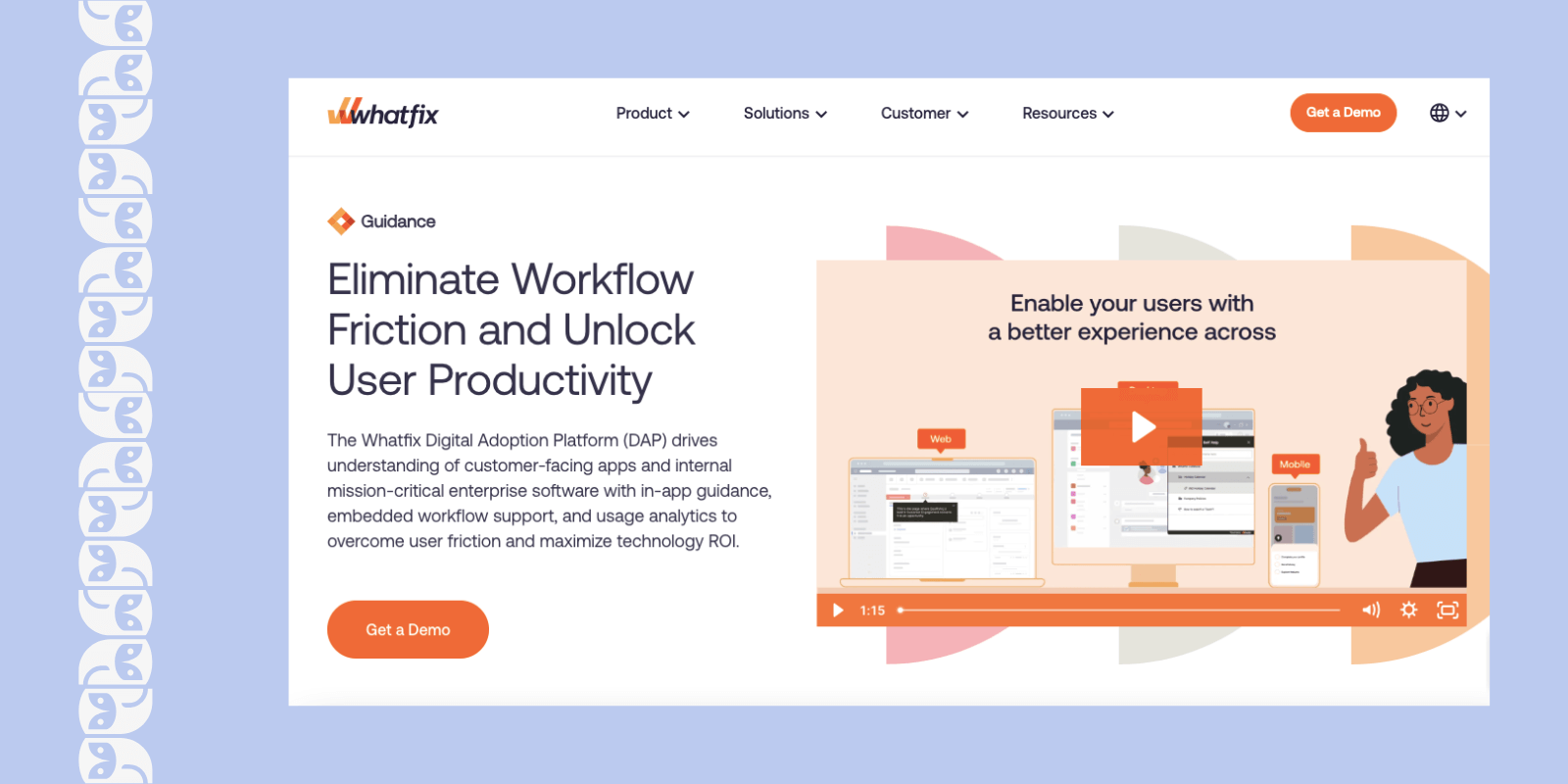
Here’s an exciting training platform that is not entirely LMS.
Whatfix is a digital adoption platform that helps to train teams and customers on how to use the software, whether they are employees, partners, or customers.
It has no code editor, which is super intuitive and allows creating and implementing in-app guidance. It usually includes product tours, interactive walk-throughs, and more. That way, end-users learn the flow without distractions from other tools or static manuals.
It also offers a sandbox environment for learners to practice tasks and limit the effects on data. Moreover, Whatfix analytics can track the behavior of learners and how they engage with the software. It helps to track adoption rates, identify friction, and see the engagement.
Thus, Whatfix seems like a powerful tool for user and employee onboarding related to software, AI, and feature adoption.
Key features of Whatfix for tech companies:
- In-App guidance & self-help centers. Whatfix leaves room for on-demand assistance with tours, walkthroughs, and searchable help.
- Mirror sandbox mode. This solution for software companies provides risk-free workflow practice for product teams and partners.
- Behavior & product analytics. Whatfix helps to track software adoption, monitor workflow completion, and find user friction points.
- AI-Powered content creation. Lastly, it offers decent AI tools to support an adoption training program.
Pros: outstanding for product adoption, combines training, practice, and analytics, offers intuitive tools.
Cons: not a complete LMS for all training types
Pricing: upon a quote and depends on the deployment scope
G2 Rating: 4.6/5
#5. Thirst: Best LMS for Social Learning and Learner-Generated Content
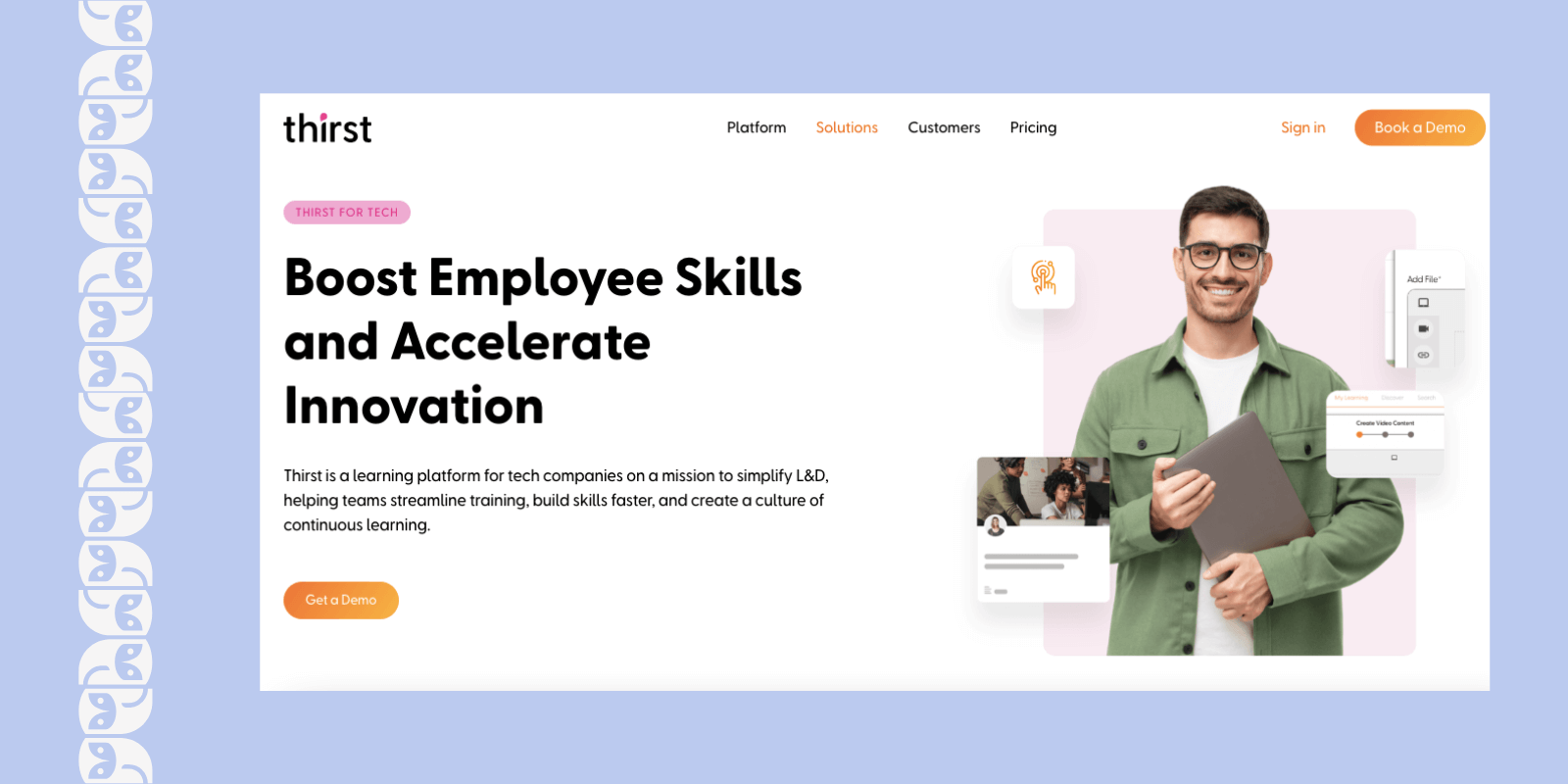
Thirst is a modern LMS that makes training interactive, personalized, and automated for tech companies that seek uncomplicated and straightforward solutions.
This LMS for tech companies provides excellent features for social learning and creating a knowledge-sharing hub. In particular, it offers learning spaces where people may use likes, comments, and shares, supporting peer-to-peer exchange.
A great advantage is that it enables learner-generated content, including videos and shared documents. That way, you can invite subject experts or ask colleagues to be ones. Also, badges and certificates provide recognition and can be used for onboarding, while AI-powered recommendations and content personalization help deliver programs differing in roles or projects.
Lastly, it provides sub-accounts for different teams and solid integrations with platforms such as LinkedIn Learning and Udemy that offer courses on demand.
Key features of Thirst for tech companies:
- Learner-generated content. With Thirst, learners can record and upload video/audio to share expertise internally.
- Social learning and engagement. Thirst fosters collaborative learning and engagement by creating an environment similar to social media.
- Badges and certificates. With it, you can issue badges and certificates to reward achievement and recognize upskilling.
- Target Spaces & Pathways. With separate spaces and paths, you can organize training by role, project, or client group.
Pros: strong social learning features; gamification; learner-generated content; flexible spaces for targeted training.
Cons: It lacks integrations with business tools and a compliance tracking suite.
Pricing: starts from $150/month (up to 25 users)
G2 Rating: 4.5/5
Conclusion: What is the Best Tech LMS Software?
Your choice will depend on your training priorities and the use case you would need to stick.
If you want a flexible solution to scale and manage experience, the best LMS for tech companies is EducateMe. It’s a multi-tenant LMS with AI automation, strong content options, and powerful reporting. It would be an excellent options onboarding, partner training, and upskilling.
What about other cases?
- For onboarding & SOPs. Trainual is best for documenting workflows and turning SOPs into structured training.
- For community & cohorts. Disco enables collaborative, peer-driven learning with live sessions and events.
- In-App training & adoption. Whatfix supports real-time product onboarding, sandbox practice, and user behavior tracking.
- Social & learner-generated content. Thirst drives engagement with peer sharing, badges, and certificates.






















